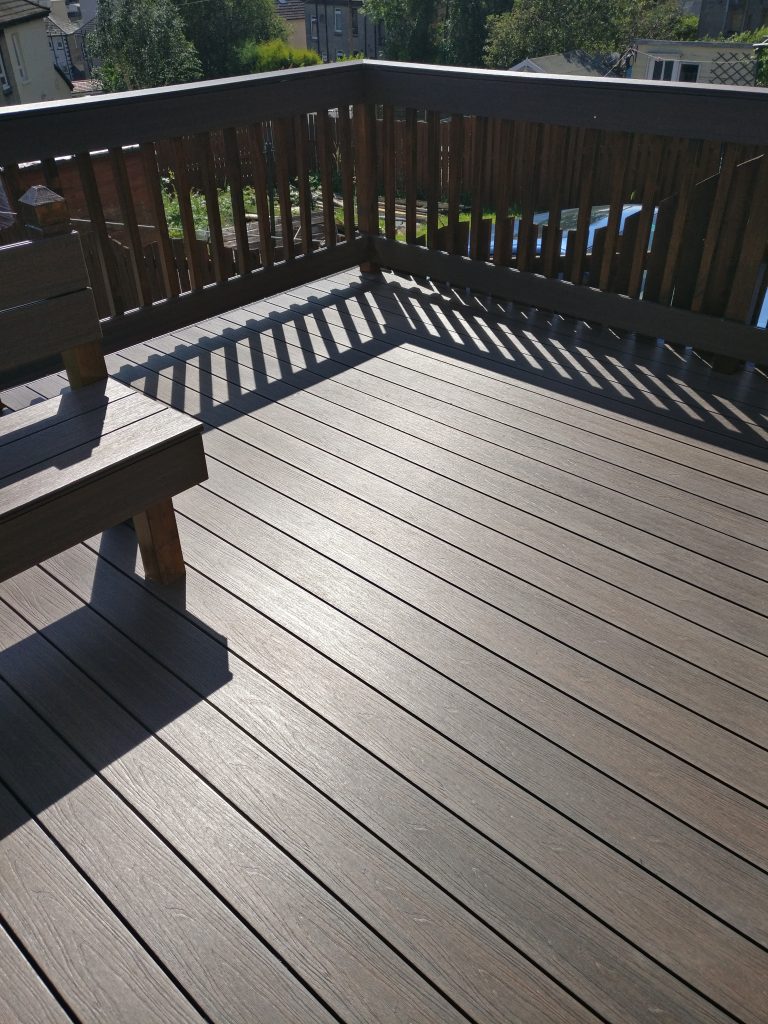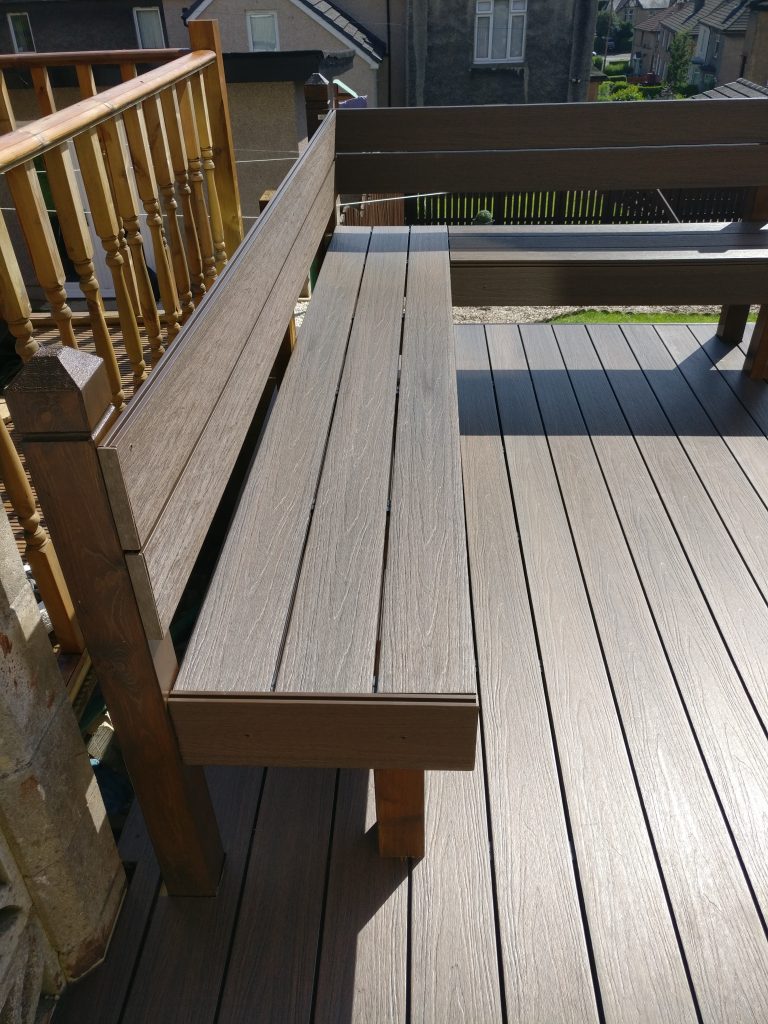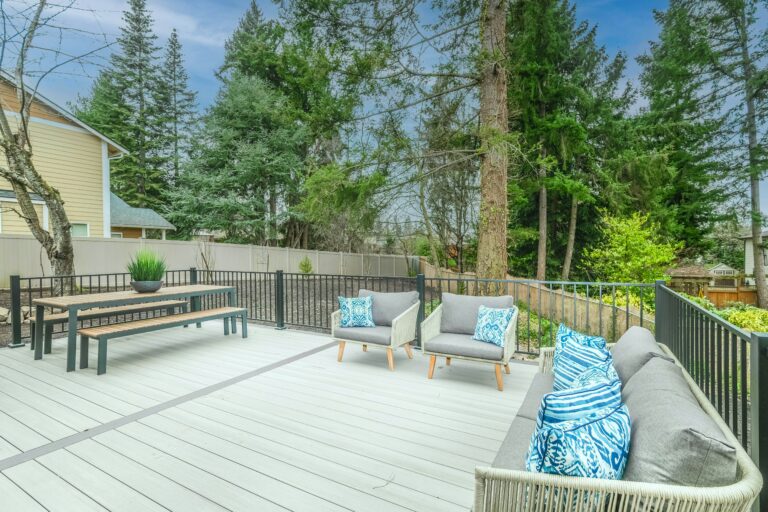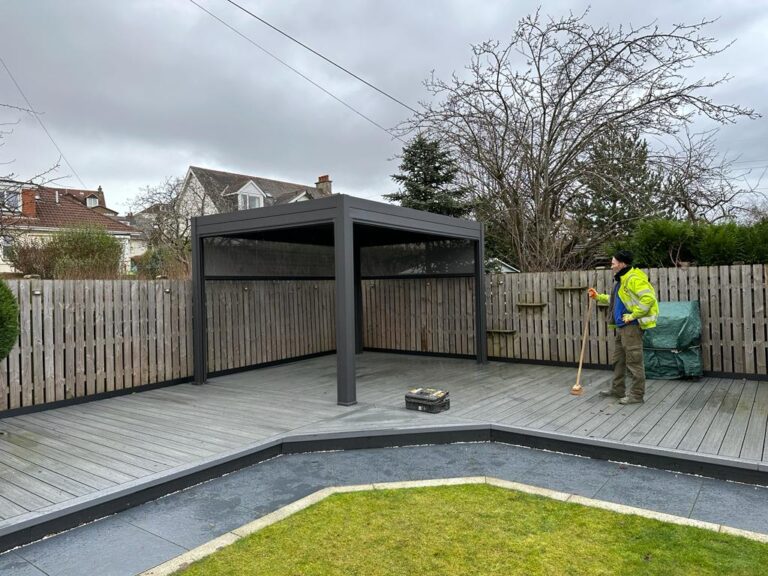Composite decking is popular, but is there something even better? Let’s explore alternatives that surpass it in terms of durability, aesthetics, and eco-friendliness.
Timber decking has its charm, but comes with drawbacks. It needs regular maintenance to avoid decay, warping, and splintering. Plus, deforestation concerns raise ethical questions.
Aluminium decking is a great alternative. It combines strength and style, is durable without constant upkeep, and resistant to rotting, splintering, and insects. Plus, aluminium can be recycled endlessly without losing its properties.
A friend installed composite decking in their patio only to be disappointed within a few years. The colour faded under the sun. But, an acquaintance opted for aluminium decking, and was amazed how it retained its vibrant appearance despite harsh weather conditions year after year.

What is composite decking?
Composite decking is an alternative to wood decking. It is made of a combination of wood fibers and recycled plastic, which is strong and long-lasting. This material looks like wood, but is stronger and more resistant to bugs, rot, and mold.
What are its features?
- Material: Wood fibers and recycled plastic make up composite decking. It is tough and can handle different climate conditions.
- Appearance: Composite decking comes in many colors, patterns, and finishes. You don’t have to sacrifice style for durability.
- Durability: Composite decks are warp-proof, splinter-proof, and decay-proof. These decks are perfect for areas with changing weather.
- Maintenance: It’s easy to take care of composite decking. Just clean it occasionally with mild soap and water.
- Sustainability: The materials used to make composite decking are recycled. This reduces waste and helps the environment.
- Cost-effectiveness: Composite decking is pricier than traditional wood options. But, it’s worth it in the long run because you don’t need to stain or seal it.
My friend has had a composite deck in his backyard for five years. Despite the changing weather, the deck looks beautiful and he doesn’t need to do much to maintain it. Plus, it’s a safe and comfortable place for his family to enjoy.

Advantages of composite decking
Composite decking offers many benefits over conventional wood decking.
-
It is highly durable and long-lasting, making it economical. Wooden decks can rot, warp, or be damaged by insects – composite decking is not affected by this. Maintenance is also minimal so homeowners save time and effort.
-
Colours and finishes of composite decking are varied, so homeowners can get the look they desire. Whether it’s a natural wood look or something more modern, there’s an option. The colour also won’t fade as it does with wood.
Plus, composite decking is eco-friendly. Made from recycled materials including plastic bags and sawdust, it helps reduce waste and deforestation. So, it adds beauty to the outdoor space while being kind to the environment.
Finally, composite decking is safer than wood decking. It’s slip-resistant even when wet, so it’s perfect for families with children or anyone who values safety. And the anti-fading properties mean it will stay vibrant in all weather conditions. Low maintenance and resilience to the elements make composite decking the best choice for enjoying your outdoor space without regular repairs or replacements.
Disadvantages of composite decking
Composite decking may have drawbacks worth considering prior to purchase. These can affect the material’s durability and look. Let’s check them out:
- Prone to Scratching: Easily damaged by scuffs and scratches, which can damage its appearance. Care must be taken when moving items across its surface.
- Higher Cost: Compared to traditional wood decking, it’s pricier. Homeowners on a tighter budget may not find this appealing.
- Potential for Fading: Over time, its color may fade because of sunlight and other elements. Proper maintenance can delay this, but it’s still a risk.
- Limited Lifespan: Despite being long-lasting, it has a shorter lifespan than natural wood decking. Refurbishment or replacement may be needed sooner than expected.
- Environmental Impact: Some components may be recycled, but the production process can have environmental implications due to energy use and waste generation.
Not to forget the benefits of composite decking, such as low maintenance, resistance to warping and rot, and various styles.
Plus, many don’t know that it was first introduced commercially in the 90s by Trex Company Inc., a major manufacturer in the industry.
Alternatives to composite decking
Are you looking for alternative decking materials? Take into account budget, maintenance, looks, and environment.
PVC and Aluminium are moisture-resistant, great for wet climates.
Pressure-treated lumber is a popular choice. Why? It’s affordable and available.
Hardwood? Timeless elegance.
PVC? Low maintenance and won’t fade.
Aluminium? Lightweight and strong.
Bamboo? Eco-friendly and stylish.
Pressure-treated lumber? Chemically treated for durability and pest resistance.
Comparison between composite decking and alternatives
When looking at composite decking versus other options, there are a few things to consider. Let’s look at the differences and benefits.
Composite decking is highly durable and long-lasting. It looks like natural wood. It’s also environmentally friendly, made from recycled materials.
Alternatives vary in durability and may need more maintenance. There is a wide range of appearances and eco-friendly materials available.
Composite decking usually needs less maintenance than alternatives. Different materials may offer unique advantages, such as cost, aesthetics, or sustainability.
Pro Tip: Think about your needs and preferences. Talk to an expert or do your own research to make sure you choose the best option.
Conclusion
In conclusion, for composite decking alternatives there are several great choices. One is natural wood decking. Its timeless look and easy installation make it a popular choice. PVC decking is also great. It’s durable and requires little maintenance, making it a good investment. If you’re looking for an eco-friendly option, bamboo decking is worth exploring. Bamboo is renewable and has similar strength and resilience to wood. Before you decide, make sure it fits your budget and design wishes.
Frequently Asked Questions
FAQ 1: What is better than composite decking?
Answer: There are several alternatives to composite decking that some homeowners prefer. These include hardwood decking, PVC decking, aluminium decking, capped polymer decking, and natural timber decking.
FAQ 2: Is hardwood decking a better option than composite decking?
Answer: Hardwood decking is considered by many to be a better option than composite decking due to its natural beauty, durability, and longevity. However, it typically requires more maintenance compared to composite decking.
FAQ 3: How does PVC decking compare to composite decking?
Answer: PVC decking is an alternative to composite decking that offers excellent moisture resistance and durability. It does not require as much maintenance as wood decking and is available in a variety of colours and styles.
FAQ 4: What are the advantages of aluminium decking over composite decking?
Answer: Aluminium decking is known for its durability, strength, and resistance to rust and corrosion. It requires very little maintenance and can withstand extreme weather conditions, making it a popular choice for some homeowners.
FAQ 5: What is capped polymer decking?
Answer: Capped polymer decking is a type of decking material that combines the benefits of composite decking and PVC decking. It offers enhanced durability, stain resistance, and fade resistance. It also requires less maintenance compared to wood decking.
FAQ 6: Can natural timber decking be a better choice than composite decking?
Answer: Natural timber decking provides a classic, authentic look that many homeowners prefer over composite decking. It offers a wide range of wood species to choose from, each with its unique characteristics. However, it requires regular maintenance to protect it from rot, decay, and insects.
{
“@context”: “https://schema.org”,
“@type”: “FAQPage”,
“mainEntity”: [{
“@type”: “Question”,
“name”: “What is better than composite decking?”,
“acceptedAnswer”: {
“@type”: “Answer”,
“text”: “There are several alternatives to composite decking that some homeowners prefer. These include hardwood decking, PVC decking, aluminium decking, capped polymer decking, and natural timber decking.”
}
}, {
“@type”: “Question”,
“name”: “Is hardwood decking a better option than composite decking?”,
“acceptedAnswer”: {
“@type”: “Answer”,
“text”: “Hardwood decking is considered by many to be a better option than composite decking due to its natural beauty, durability, and longevity. However, it typically requires more maintenance compared to composite decking.”
}
}, {
“@type”: “Question”,
“name”: “How does PVC decking compare to composite decking?”,
“acceptedAnswer”: {
“@type”: “Answer”,
“text”: “PVC decking is an alternative to composite decking that offers excellent moisture resistance and durability. It does not require as much maintenance as wood decking and is available in a variety of colours and styles.”
}
}, {
“@type”: “Question”,
“name”: “What are the advantages of aluminium decking over composite decking?”,
“acceptedAnswer”: {
“@type”: “Answer”,
“text”: “Aluminium decking is known for its durability, strength, and resistance to rust and corrosion. It requires very little maintenance and can withstand extreme weather conditions, making it a popular choice for some homeowners.”
}
}, {
“@type”: “Question”,
“name”: “What is capped polymer decking?”,
“acceptedAnswer”: {
“@type”: “Answer”,
“text”: “Capped polymer decking is a type of decking material that combines the benefits of composite decking and PVC decking. It offers enhanced durability, stain resistance, and fade resistance. It also requires less maintenance compared to wood decking.”
}
}, {
“@type”: “Question”,
“name”: “Can natural timber decking be a better choice than composite decking?”,
“acceptedAnswer”: {
“@type”: “Answer”,
“text”: “Natural timber decking provides a classic, authentic look that many homeowners prefer over composite decking. It offers a wide range of wood species to choose from, each with its unique characteristics. However, it requires regular maintenance to protect it from rot, decay, and insects.”
}
}]
}








